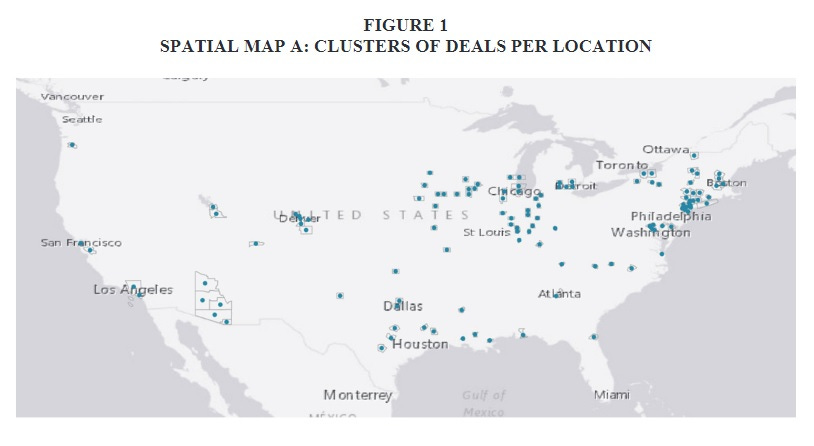Rural America Gets Extra Hurt by Corporate Giveaways
Economic desperation leads to worse outcomes.

If you’re a subscriber and have been enjoying this newsletter recently, please take a moment to forward it around to family, friends, neighbors, or anyone else you think might like it too. Just use the green button below. Thanks!
Big tech companies — Amazon, Facebook, Google, and the like — are some of the prime beneficiaries of corporate economic development incentives. They’re the sort of companies politicians love to “partner” with because they’re supposedly “the future” of the economy.
In a new study called “Where in America Are the Tech Firms Going and Why,” Nikolay Anguelov and Brenna Jewitt from the University of Massachusetts, Dartmouth, looked at incentives for tech companies to relocate or open new facilities between 1980 and 2018, in order to figure out what drew companies to certain places and what price lawmakers paid to makes those moves happen.
The study is interesting enough just for what it is. But — along with some other data — it also shows how those who live in rural America get extra hosed when politicians start doling out corporate giveaways.
First, here’s a map Anguelov and Jewitt included in their study:

So tech firms, when they move from wherever they were founded (Silicon Valley, usually) continue to cluster together, and those clusters have predominantly formed in the Acela corridor between Boston and Washington, D.C., with smaller clusters around Chicago, Denver, and Texas’ major cities. Moves to areas that are not major urban centers are few and far between, and as the researchers noted, tended to be for manufacturing or R&D, work that can be a bit more disconnected from the rest of the company’s offerings.
The two researchers then add this: “The results also indicate that the fairly remote, in terms of being away from major cities and other clusters, locales consistently tend to end up creating a lower number of jobs at higher dollar amounts spent per each.”
So rural America, when it can make a deal at all, pays more for less than everyone else.
Let’s add some more data to that assertion. First, a study of state and local tax incentives from earlier this year found that “counties with an average wage of less than $40,000 pay over $400,000 per job in the mean subsidy deal. Meanwhile, counties with average wages over $100,000 pay less than $100,000 per job in a given subsidy.” Since urban areas at the moment are richer, on average, than rural ones, this likely breaks down on urban/rural lines as well. That’s all a lot of money for everyone to be paying, but it’s a demonstrably worse outcome for poorer places.
A separate study found that when it comes to non-tax corporate incentives — things such as straight cash grants, low- or no-interest loans, or free and cheap land — rural areas actually see a negative impact on jobs in both the short and medium term, with the latter being quite significant, which was not the case for urban areas. Incentives didn’t help urban cores, but they actively hurt rural areas, which fewer jobs available in the out years than there would have been otherwise.
Why is this the case? Why does rural America pay so much for so little? From talking to people in the course of writing my book, the simple answer is desperation. Places that have been left beyond by political choices that led to outsourced jobs, shuttered factories, industrial decline, and an exodus of younger, wealthier millennials to urban cores are so desperate for anything that resembles an influx of jobs that their leaders are willing to pay any price and make any accommodation — that’s true even for those who have looked at the data and know the deal won’t be worth the cost in the long run.
And as sociologist Arlie Hochschild explained in “Strangers in Their Own Land,” corporations actively court places that are more rural, conservative, and religious, because they think, with good historical reason, that those areas will be more deferential to industry, enabling them to extract more giveaways for less economic output.
This is all a toxic combination when it comes to the public coffers and small economies.
When most big corporations, and tech firms especially, go looking for a new location, they typically want a bunch of things that have nothing to do with taxes or other incentives: Major universities, international airports, public transit, a rollicking social life for young workers, etc. So rural America is already at a disadvantage when it tries to play the corporate incentive game; it doesn’t have those things and can’t supply them. Thus, those towns pay through the nose for whatever scraps corporations are willing to throw their way, which actively hurts their economies in the long term.
A better way would be to reject the game entirely and build out local, sustainable, resilient economies based on smaller businesses, not toss offs from tech titans or other corporate mega-firms. But that would require the political will to put aside decades of economic development conventional wisdom.
One more thing: This was a refreshing story.


Thanks for reading this edition of Boondoggle. If you don’t subscribe already, just click the green button below.
If you liked this post, take a moment and click the little heart under the headline or below. It helps.
If you’re already a subscriber, please forward this around to friends, family, neighbors, or whoever you think might like it, and tell them to sign up too.
Finally, if you’d like to pick up a copy of my book, The Billionaire Boondoggle, go here. Thanks again!
— Pat Garofalo


